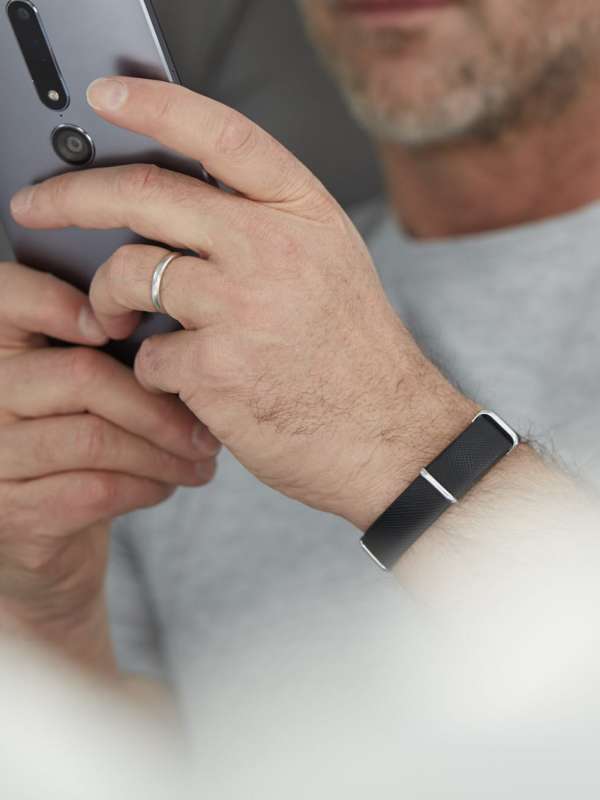Healthy sleep habits and blood pressure go hand in hand, and this article explains why. From the latest technology like the Aktiia bracelet that monitors blood pressure around the clock to the life-giving links between a good night’s sleep and heart health, it’s all here.
Sleep keeps more than blood pressure in balance
Healthy sleep habits and blood pressure levels are two sides of the same bed.
On one side of the pillow, you sleep soundly and keep your blood pressure in check – a foundation for a long and healthy life. On the other, there’s broken sleep (either a lack of deep sleep or getting the hours you need) plus an increased risk of high blood pressure – a negative combination that can impact your physical and mental health in many ways.
“The patterns while you’re sleeping have been shown to correlate significantly to overall blood pressure-driven risk, cardiovascular risk.”
– Dr Jay Shah, Cardiologist, in conversation with Melissa Joy Dobbins MS, RDN, CDCES from Sound Bites Podcast (ep. 245)
We are only beginning to understand the complex relationship between sleep and blood pressure and their collective health implications and impacts. A recent article on nocturnal hypertension looked at the potential risks of high blood pressure at night. Based on a 2020 study by Japan Ambulatory Blood Pressure Monitoring Prospective (JAMP), raised blood pressure during sleep increases the risks of heart failure and cardiovascular disease.
This article goes a little deeper into the relationship between sleep and blood pressure. It looks at the intricacies and interactions of sleep and blood pressure. Like the natural sleep cycle, sleep quality, underlying health conditions, plus a few simple lifestyle strategies. Let’s explore these links and what they indicate for overall health and wellbeing.
Understand the matrix of blood pressure, sleep, and health
There’s an intrinsic relationship between sleep quality and cardiovascular health. Likewise the links between blood pressure and general health and brain function are widely acknowledged. Harvard Health research has also highlighted the importance of consistent, restorative sleep for healthy blood pressure levels. A recent study on 7,483 midlife adults highlights the alarming connection between sleep problems and heart-disease risk. It focused on aspects of sleep like regularity, satisfaction, alertness, efficiency, and duration.
Findings revealed that those experiencing a combination of sleep issues, like trouble falling asleep or sleeping less than six hours, might face nearly triple the risk of heart disease. This emphasizes the importance of sufficient sleep, and the potentially life-shortening effects from a lack of shut-eye.
It also underlines the need for data for understanding, feedback and optimization – which Aktiia’s unique blood pressure solution delivers. So, instead of just counting sheep, you can better understand the relationship of sleep patterns with your blood pressure and how you can optimize your own health.
Work with your natural rhythm
The circadian rhythm is the body’s internal clock, regulating physiological changes over a 24-hour cycle. It affects blood pressure, which naturally dips during the night as part of restorative sleep and rises before waking. This cycle aligns with the body’s need for rest and activity, demonstrating the intertwined relationship between sleep and overall health.
Healthy sleep habits are not only essential for a good night’s rest but also play a vital role in reducing blood pressure and managing hypertension. Some simple lifestyle changes that help you work in harmony with your circadian cycle are:
- Seeking out early sunlight exposure to reinforce the circadian rhythm
- Following a consistent sleep schedule
- Getting at least some moderate exercise every day
- Avoiding caffeine after noon
- Limiting artificial light before bed (keep that smartphone out of the bedroom!)
- Only napping for short period and early afternoon at the latest
- Creating a bedroom environment that’s conducive to sleep.
Together, these aid the body’s natural rhythm, fostering both sleep quality and cardiovascular health. And they give you the best chance of keeping your blood pressure under control.
Make sleep central to your cardiovascular health
Persistent lack of sleep is closely linked to obesity and high blood pressure, both of which are major risk factors for cardiovascular diseases. When sleep is compromised, the body’s ability to regulate essential functions, such as metabolism and stress response, can be disrupted.
In the case of obesity, lack of sleep may lead to imbalances in hormones which control appetite. This can lead to increased hunger and cravings for high-calorie, sugary foods, thereby promoting weight gain. Plus, lack of sleep may reduce the body’s ability to digest these foods efficiently.
As for high blood pressure, sleep plays a vital role in regulating stress hormones, maintaining a healthy heart rate, and supporting vascular health. Chronic sleep deprivation may lead to prolonged periods of increased blood pressure during waking hours, putting added strain on the heart and blood vessels. This constant pressure can cause the arteries to become less flexible and more prone to damage, elevating the risk of hypertension.
Both obesity and hypertension are known risk factors for heart disease, and connections between these conditions and inadequate sleep underscores the necessity of sufficient rest for maintaining heart health. By recognizing the intricate relationship between sleep, weight management, and blood pressure regulation, you can take proactive steps to ensure that sleep patterns support your cardiovascular wellbeing.
The dangerous duo of sleep apnea and blood pressure
Sleep apnea, specifically Obstructive Sleep Apnea (OSA), is a condition characterized by repeated interruptions in breathing during sleep. These can last from a few seconds to minutes and may occur 30 or more times per hour. Where the oxygen level in the blood drops, there are a cascade of effects on the cardiovascular system:
- Impact on blood pressure. When breathing is interrupted, the body’s immediate response is to increase the heart rate and constrict blood vessels to ensure that enough oxygen reaches vital organs. This reaction leads to a temporary spike in blood pressure which, over time, can contribute to a persistent increase.
- Night-time awakening. Brief stoppages in breathing often cause wakeful nights and prevent the body from entering deeper, restorative stages of sleep, where blood pressure naturally dips. The resulting lack of deep sleep can contribute to overall higher blood pressure levels.
- Long-term cardiovascular risks. Persistent high blood pressure is a well-known risk factor for heart disease, stroke, and heart failure. People with untreated sleep apnea may find it more challenging to control their blood pressure, even with medication, leading to increased long-term cardiovascular risks.
- Combined health issues. It’s worth noting that sleep apnea often coexists with other health conditions that can also affect blood pressure. For example, diabetes which has been described as an “escalating crisis”. That makes it more important to manage diabetes and sleep apnea by using blood pressure as a key indicator for overall respiratory and cardiovascular health.
Why 24/7 blood pressure monitoring matters
‘White coat effect’ and ‘masked hypertension’ might sound like ghosts that go bump in the night. But, in fact, they’re intriguing phenomena that may account for differences in blood pressure readings between clinical settings and at home.
The white coat effect is where patients exhibit higher blood pressure levels due to stress or anxiety related to the clinical setting, causing a temporary elevation. On the other hand, masked hypertension presents readings that are normal in a clinical setting but elevated at home. Lifestyle factors, including sleep patterns and quality, may contribute to the latter and their relationship with sleep holds significant clues.
These contrasting conditions highlight the importance of monitoring blood pressure in a more consistent and natural environment. The Aktiia device offers 24/7 monitoring automatically logs blood pressure, both day and night. As you’re unaware it’s happening, there’s no risk of anxiety about your blood pressure contributing to skewed readings. It also makes monitoring blood pressure during sleep more convenient than ever. It’s a comprehensive understanding of blood pressure fluctuations that traditional methods miss – and these hidden patterns can reveal a complete picture of cardiovascular health.
Early detection is another benefit of continuous monitoring. Sleep measurements allow for the early identification of potential health problems such as masked hypertension. Plus, the data can be used to improve diagnoses, integrate health information, and help healthcare providers offer more personalized, timely and targeted care.
Want to learn how to monitor your blood pressure effectively? Sign up for our newsletter and stay ahead of the curve!
Monitor, measure, manage, and motivate
Finding balance in your lifestyle – awake and asleep – is crucial for controlling blood pressure. That’s why monitoring blood pressure 24/7 is becoming a key health marker and motivator. Wearable technology is helping with a convenient, always-on way to keep track of your numbers, know what they mean, and spot patterns related to lifestyle.
So, when you make changes, you can see how they affect the data which spurs you on further. This could be moderating alcohol, staying hydrated, cutting back on caffeine, or regular exercise. Seeing your progress toward targets related to diet, hydration, and fitness is also likely to a positive effect on your sleep quality, not just your blood pressure. It’s a virtuous circle that helps you stick to your plan – it’s what we’ve coined the Aktiia effect.
The holistic health benefits of a rested body
The connections between sleep and cardiovascular health are clear: a well-rested body not only ensures a healthy heart but also maintains optimal blood pressure levels. Recognizing and addressing sleep-related issues is a crucial step toward overall wellbeing. In our fast-paced world, the heart-healthy benefits of a good night’s sleep are as vital as ever, not only for keeping your blood pressure in check.
Disclaimer: The content provided here is for informational purposes only and should not replace personalized medical advice.
Sources:
Addressing poor sleep may help heart health, Harvard Health, August 2022 – https://www.health.harvard.edu/struggling-to-sleep-your-heart-may-pay-the-price
National Sleep Foundation, Circadian rhythm, August 2023 – https://www.sleepfoundation.org/circadian-rhythm
CDC, Sleep and Chronic Disease, September 2022 – https://www.cdc.gov/about-sleep-chronic-disease
AMA, Sleep Apnea and Heart Health, 2021 – https://www.heart.org/en/health-topics/consumer-healthcare/what-is-cardiovascular-disease/sleep-apnea-and-heart-disease-stroke
What is masked hypertension? Harvard Health, January 2016 – https://www.health.harvard.edu/heart-health-ask-the-doctor-what-is-masked-hypertension
Blood Pressure and Alcohol: What You Should Know, May 2023 – https://aktiia.com/uk/can-red-wine-really-help-to-lower-blood-pressure



